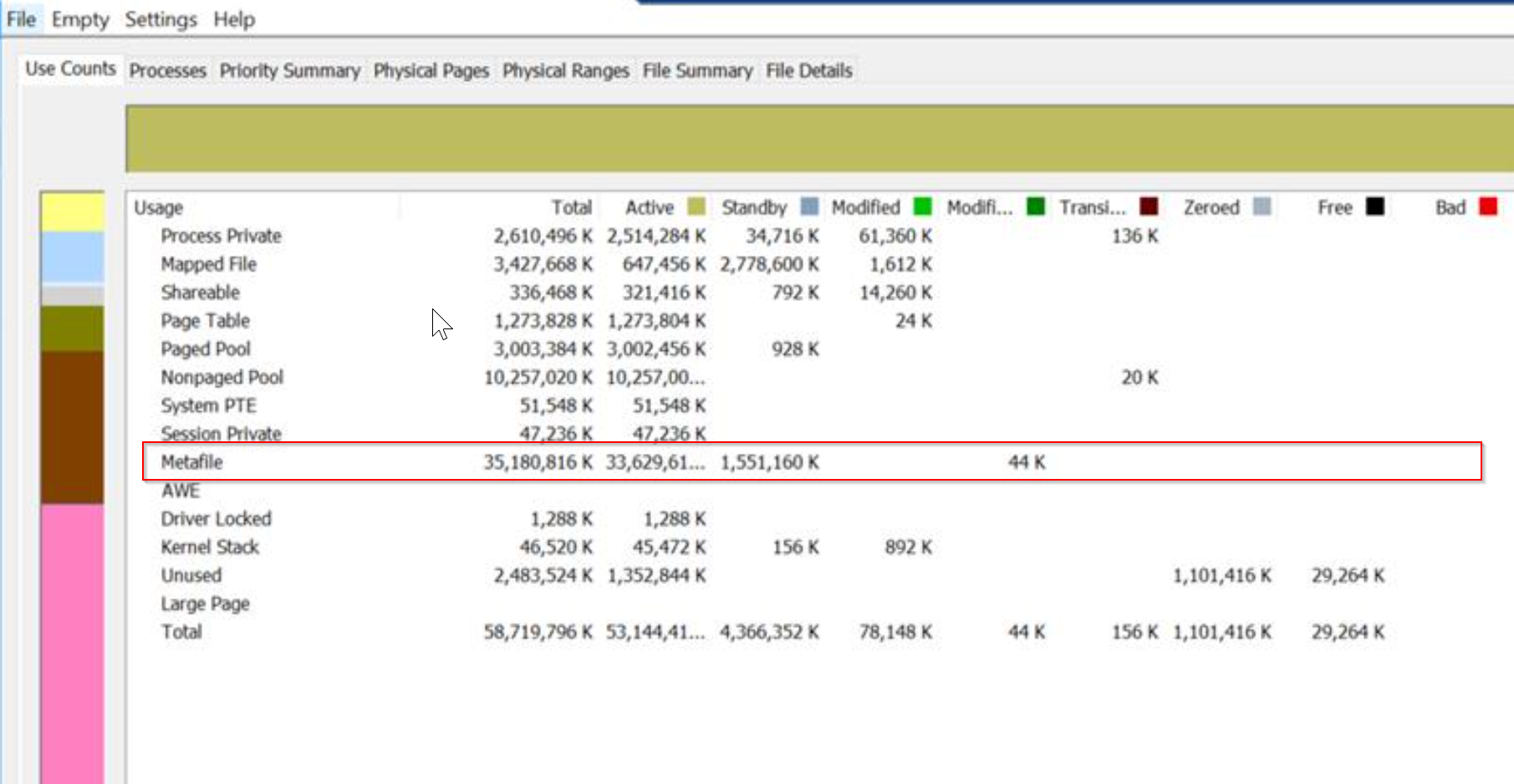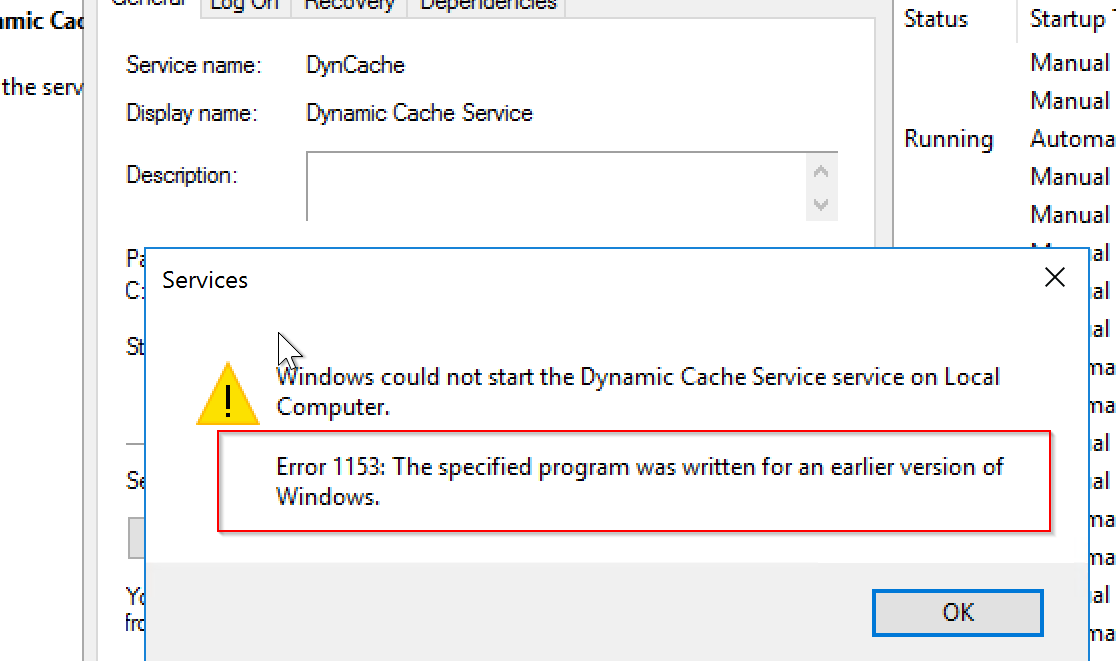SystemCacheWs - MFT Cache
Recently I worked on a very interesting issue, where Windows system consumed 99% of available RAM, but no proccess table via proccess explorer / task manager was showing no particular proccess, consuming this amount of RAM.
By taking WPR trace I see that most of the RAM is consumed by an entity called SystemCacheWs:

When viewing the system from RAMMAP, this is how consumption looked like:

What is this mystery Metafile entry? It is a cache for MFT table.
Back in a day, (windows server 2003/2008 era) there was a way to control the metafile usage with an official Microsoft tool Dyncache, but this tool wont work on modern OS:

In modern OS the cache control should be fully automatic, and proper solution is to change the way on how files are opened/handled:
Troubleshoot Cache and Memory Manager Performance Issues | Microsoft Learn

However, is still possible to flush / limit the cache by calling Windows API directly:
Below is a simple POC on how to flush the cache via WinAPI in C++:
#include <windows.h>
#include <iostream>
#define SE_INCREASE_QUOTA_NAME TEXT("SeIncreaseQuotaPrivilege")
#define SE_PROFILE_SINGLE_PROCESS_NAME TEXT("SeProfileSingleProcessPrivilege")
// For NtSetSystemInformation (looked up from ntdll.dll)
typedef NTSTATUS(NTAPI* pNtSetSystemInformation)(
INT SystemInformationClass,
PVOID SystemInformation,
ULONG SystemInformationLength);
// System info classes
const INT SystemFileCacheInformation = 0x15;
const INT SystemMemoryListInformation = 0x50;
const INT MemoryPurgeStandbyList = 4;
BOOL EnablePrivilege(LPCTSTR privilegeName) {
HANDLE hToken;
TOKEN_PRIVILEGES tp;
if (!OpenProcessToken(GetCurrentProcess(), TOKEN_ADJUST_PRIVILEGES | TOKEN_QUERY, &hToken)) return FALSE;
LookupPrivilegeValue(NULL, privilegeName, &tp.Privileges[0].Luid);
tp.PrivilegeCount = 1;
tp.Privileges[0].Attributes = SE_PRIVILEGE_ENABLED;
AdjustTokenPrivileges(hToken, FALSE, &tp, 0, NULL, NULL);
CloseHandle(hToken);
return (GetLastError() == ERROR_SUCCESS);
}
BOOL PurgeStandbyList() {
HMODULE hNtDll = LoadLibrary(TEXT("ntdll.dll"));
if (!hNtDll) {
std::cerr << "Failed to load ntdll.dll: " << GetLastError() << std::endl;
return FALSE;
}
pNtSetSystemInformation NtSetSystemInformation = (pNtSetSystemInformation)GetProcAddress(hNtDll, "NtSetSystemInformation");
if (!NtSetSystemInformation) {
std::cerr << "Failed to get NtSetSystemInformation: " << GetLastError() << std::endl;
FreeLibrary(hNtDll);
return FALSE;
}
if (!EnablePrivilege(SE_PROFILE_SINGLE_PROCESS_NAME)) {
std::cerr << "Failed to enable SeProfileSingleProcessPrivilege: " << GetLastError() << std::endl;
FreeLibrary(hNtDll);
return FALSE;
}
INT command = MemoryPurgeStandbyList;
NTSTATUS status = NtSetSystemInformation(SystemMemoryListInformation, &command, sizeof(INT));
FreeLibrary(hNtDll);
if (status != 0) {
std::cerr << "NtSetSystemInformation failed for standby purge: " << status << std::endl;
return FALSE;
}
std::cout << "Standby list purged successfully." << std::endl;
return TRUE;
}
int main() {
if (!EnablePrivilege(SE_INCREASE_QUOTA_NAME)) {
std::cerr << "Failed to enable SeIncreaseQuotaPrivilege: " << GetLastError() << std::endl;
return 1;
}
// Getting current cache limits
SIZE_T minCurrent, maxCurrent;
DWORD flagsCurrent;
GetSystemFileCacheSize(&minCurrent, &maxCurrent, &flagsCurrent);
// Setting low limits to force file cache flush
SIZE_T lowMin = 1024 * 1024; // 1 MB
SIZE_T lowMax = 1024 * 1024; // 1 MB
DWORD flags = 0;
if (!SetSystemFileCacheSize(lowMin, lowMax, flags)) {
std::cerr << "Failed to set low cache: " << GetLastError() << std::endl;
return 1;
}
std::cout << "File cache shrunk. Wait 10s for eviction..." << std::endl;
Sleep(10000); // Give time for system to adjust
// Now purge the standby list (EmptyStandbyList equivalent)
PurgeStandbyList();
// Restore original or default (e.g., max to -1 for unlimited)
if (!SetSystemFileCacheSize(minCurrent, maxCurrent, flagsCurrent)) {
std::cerr << "Failed to restore: " << GetLastError() << std::endl;
}
std::cout << "Cache flushed and restored." << std::endl;
return 0;
}
If you want to intentionally populate cache:
- Create a test data:
# --- CONFIG ---
$Root = "D:\CacheTest-MFT"
$Dirs = 2000 # dirs per level
$FilesPer = 4500 # files per dir
$Levels = 2 # directory depth (increase to 2 if you want more dirs)
$NamePad = 8 # longer names => bigger dir indexes
New-Item -ItemType Directory -Path $Root -Force | Out-Null
function New-Chunk($base, $dirs, $files) {
# Create subdirs
0..($dirs-1) | ForEach-Object {
$d = Join-Path $base ("d{0}" -f $_.ToString().PadLeft($NamePad,'0'))
New-Item -ItemType Directory -Path $d -Force | Out-Null
# Create zero-byte files (metadata stress, minimal data)
0..($files-1) | ForEach-Object {
New-Item -ItemType File -Path (Join-Path $d ("f{0}.dat" -f $_.ToString().PadLeft($NamePad,'0'))) -Force | Out-Null
}
}
}
$curr = $Root
for ($level=1; $level -le $Levels; $level++) {
New-Chunk -base $curr -dirs $Dirs -files $FilesPer
if ($level -lt $Levels) {
$next = Join-Path $curr ("L{0}" -f $level)
New-Item -ItemType Directory -Path $next -Force | Out-Null
$curr = $next
}
}
- Hammer the test data:
#include <windows.h>
#include <processthreadsapi.h> // For SetThreadInformation
#include <iostream>
#include <string>
#include <vector>
#include <thread>
#include <random>
#include <atomic>
#define DIR_PATH L"D:\\CacheTest-MFT\\" // Wide literal; base path for recursive search
#define FILE_PATTERN L"*.dat" // Wide literal; pattern to match
#define ACCESS_ITERATIONS 100000 // Per thread per file; increase for more pressure
#define CHUNK_SIZE 4096 // Read 4KB chunks for more cache hit
#define NUM_THREADS 8 // Threads per file; scale with CPU cores
#define USE_LOW_PRIORITY false // Set to true to demo mitigation (requires Windows 10+)
BOOL SetThreadMemoryPriority(HANDLE hThread, ULONG priority) {
MEMORY_PRIORITY_INFORMATION mpi = { priority };
return SetThreadInformation(hThread, ThreadMemoryPriority, &mpi, sizeof(mpi));
}
void RandomAccessThread(void* mappedView, SIZE_T fileSize, std::atomic<bool>& stopFlag) {
std::random_device rd;
std::mt19937 gen(rd());
std::uniform_int_distribution<SIZE_T> dist(0, fileSize - CHUNK_SIZE);
HANDLE hThread = GetCurrentThread();
if (USE_LOW_PRIORITY) {
// Use 1 for very low priority (as per docs: 1=very low, 5=normal)
if (!SetThreadMemoryPriority(hThread, 1)) {
std::cerr << "Failed to set low memory priority: " << GetLastError() << std::endl;
}
}
char buffer[CHUNK_SIZE];
while (!stopFlag.load()) {
for (int i = 0; i < ACCESS_ITERATIONS; ++i) {
SIZE_T offset = dist(gen);
memcpy(buffer, (char*)mappedView + offset, CHUNK_SIZE); // Random read
if (i % 10000 == 0) std::cout << "Accessed at offset " << offset << std::endl;
Sleep(1); // Throttle to observe
}
// Loop again for continuous access
}
}
// Recursive function to collect files matching pattern
void CollectFilesRecursive(const std::wstring& baseDir, const std::wstring& pattern, std::vector<std::wstring>& files) {
std::wstring searchPath = baseDir + L"*"; // First, find all files/dirs in current dir
WIN32_FIND_DATAW findData;
HANDLE hFind = FindFirstFileW(searchPath.c_str(), &findData);
if (hFind == INVALID_HANDLE_VALUE) {
std::cerr << "Failed to open directory " << std::string(baseDir.begin(), baseDir.end()) << ": " << GetLastError() << std::endl;
return;
}
do {
if (wcscmp(findData.cFileName, L".") == 0 || wcscmp(findData.cFileName, L"..") == 0) {
continue; // Skip current and parent
}
std::wstring fullPath = baseDir + findData.cFileName;
if (findData.dwFileAttributes & FILE_ATTRIBUTE_DIRECTORY) {
// Recurse into subdirectory
CollectFilesRecursive(fullPath + L"\\", pattern, files);
} else {
// Check if file matches pattern (simple wildcard match for *.dat)
if (wcsstr(findData.cFileName, pattern.c_str() + 1) != nullptr) { // Skip '*' in pattern
files.push_back(fullPath);
}
}
} while (FindNextFileW(hFind, &findData) != 0);
FindClose(hFind);
}
int main() {
std::wstring dir = DIR_PATH;
std::wstring pattern = FILE_PATTERN;
std::vector<std::wstring> files;
CollectFilesRecursive(dir, pattern, files);
if (files.empty()) {
std::cerr << "No matching files found recursively." << std::endl;
return 1;
}
std::cout << "Found " << files.size() << " files recursively." << std::endl;
std::vector<HANDLE> fileHandles;
std::vector<HANDLE> mappingHandles;
std::vector<void*> mappedViews;
std::vector<std::vector<std::thread>> threadGroups;
std::vector<std::atomic<bool>> stopFlags(files.size());
for (size_t i = 0; i < files.size(); ++i) {
const std::wstring& file = files[i];
HANDLE hFile = CreateFileW(file.c_str(), GENERIC_READ, FILE_SHARE_READ, NULL, OPEN_EXISTING,
FILE_ATTRIBUTE_NORMAL | FILE_FLAG_RANDOM_ACCESS, NULL);
if (hFile == INVALID_HANDLE_VALUE) {
std::cerr << "Failed to open file: " << GetLastError() << std::endl;
continue;
}
fileHandles.push_back(hFile);
LARGE_INTEGER fileSize;
GetFileSizeEx(hFile, &fileSize);
if (fileSize.QuadPart < CHUNK_SIZE) continue;
HANDLE hMapping = CreateFileMappingW(hFile, NULL, PAGE_READONLY, 0, 0, NULL);
if (hMapping == NULL) {
std::cerr << "Failed to map file: " << GetLastError() << std::endl;
CloseHandle(hFile);
continue;
}
mappingHandles.push_back(hMapping);
void* mappedView = MapViewOfFile(hMapping, FILE_MAP_READ, 0, 0, 0);
if (mappedView == NULL) {
std::cerr << "Failed to view map file: " << GetLastError() << std::endl;
CloseHandle(hMapping);
CloseHandle(hFile);
continue;
}
mappedViews.push_back(mappedView);
// Spawn threads for this file
stopFlags[i].store(false);
threadGroups.emplace_back();
for (int t = 0; t < NUM_THREADS; ++t) {
threadGroups.back().emplace_back(RandomAccessThread, mappedView, (SIZE_T)fileSize.QuadPart, std::ref(stopFlags[i]));
}
std::cout << "Mapped and accessing file." << std::endl; // Skip path print to avoid wcout for simplicity
}
std::cout << "All files mapped. Press Enter to stop..." << std::endl;
std::cin.get(); // Wait for user input to stop
// Stop all threads
for (auto& flag : stopFlags) flag.store(true);
for (auto& group : threadGroups) {
for (auto& th : group) if (th.joinable()) th.join();
}
// Cleanup
for (auto view : mappedViews) UnmapViewOfFile(view);
for (auto mapping : mappingHandles) CloseHandle(mapping);
for (auto file : fileHandles) CloseHandle(file);
return 0;
}